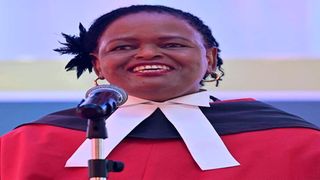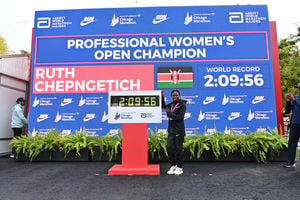
Chief Justice Martha Koome.
| File | Nation Media GroupNews
Premium
Judges seek arrest privileges similar to those of MPs
The Judicial Service Commission (JSC) wants judges accorded privileges similar to those of MPs, who cannot be arrested in the precincts of Parliament.
Chief Justice Martha Koome is pushing for the adoption of procedures for handling judges suspected of breaking the law so as to avoid the embarrassment of police raiding their chambers.
In a meeting with Interior CS Fred Matiang’i and Inspector-General of Police Hillary Mutyambai, Justice Koome, who is also the JSC chairperson, urged the creation of a committee to formulate the guidelines.
The meeting was held a few days after Directorate of Criminal Investigations officers on July 22 raided the chambers of High Court Judge Aggrey Muchelule over claims of corruption.
Justice Muchelule, the presiding judge of the Family Division, was picked up alongside his High Court colleague Said Chitembwe for questioning at the DCI headquarters.
Soon after the incident, Justice Koome called a meeting with Dr Matiang’i and Mr Mutyambai. The thinking was that the raid had caused anxiety among judicial officers and it was also seen as an infringement on the independence and integrity of the Judiciary.
In August 2018, a similar scene played out as DCI boss George Kinoti and Director of Public Prosecutions Noordin Haji sought to pick up Deputy Chief Justice Philomena Mwilu on suspicion of corruption, failure to pay taxes and improper dealings with collapsed Imperial Bank.
Justice Mwilu later sued and the charges were quashed.
No arrest in chambers
“The JSC is of the view that judges cannot be arrested in their chambers as is the case with members of Parliament, who cannot be arrested within the precincts of Parliament,” a source at the Judiciary, who asked not to be named, told the Nation.
The source said that following the saga involving the two judges, JSC felt that protocols needed to be formulated on handling judges suspected of committing offences.
“There is a need to formulate rules and protocols where any allegation should be followed by due process. Judges should be handled in a particular manner in the event of any criminal allegations against them,” the source added.
Those in the meeting agreed that a panel of the JSC and senior officials from the Interior ministry be formed to develop guidelines on how to deal with such matters when they arise.
The source said that while the JSC recognises that judges are not above the law, they have a responsibility as custodians of the law and defenders of the people’s rights as adjudicators.
Anxiety after arrests
Following the raid, CJ Koome issued a statement voicing concerns about the anxiety the arrests had caused among judicial officers.
“I assure all judges and judicial officers that the independence of the Judiciary and their constitutional duties are protected by the Constitution. They should continue discharging their duties without any fear in accordance with their oath of office,” she said.
The DCI later tweeted that the police were acting on intelligence.
“The judges cooperated with the investigating team, recorded their statements and left to continue with their duties. The investigations are ongoing,” the DCI tweeted.
A day after the arrests, the Kenya Judges and Magistrates Association sued, seeking to stop the prosecution of the two judges.
Through lawyer Danstan Omari, KMJA asked the court to bar the police from arresting and charging the two pending the hearing of their case.
In opposing the case, the police claimed they recovered Sh6.1 million in US currency from the chambers of one of the judges.
In an affidavit, Chief Inspector Felix Karisa said detectives raided the judges’ chambers after a tip that they were about to receive a Sh7 million bribe.
“We want to put the record straight that the judges were not arrested or harassed as they claim, but they willingly agreed to accompany us to the DCI headquarters to record their statements over the bribery claims,” Mr Karisa said in the affidavit.
The revelation contradicts an inventory filed in court by Mr Omari that stated no money was seized from the chambers. The inventory was signed by the two judges and police officers.
Mr Karisa said the officers were informed that the money was to be delivered in the residence of one of the judges but the venue was changed to the chambers at the Milimani courthouse.
Police then raided the chambers without a search warrant, because there was no time to obtain the order.
Justice James Makau extended the order stopping the arrest of the judges and directed the other parties to file responses before October 18.





